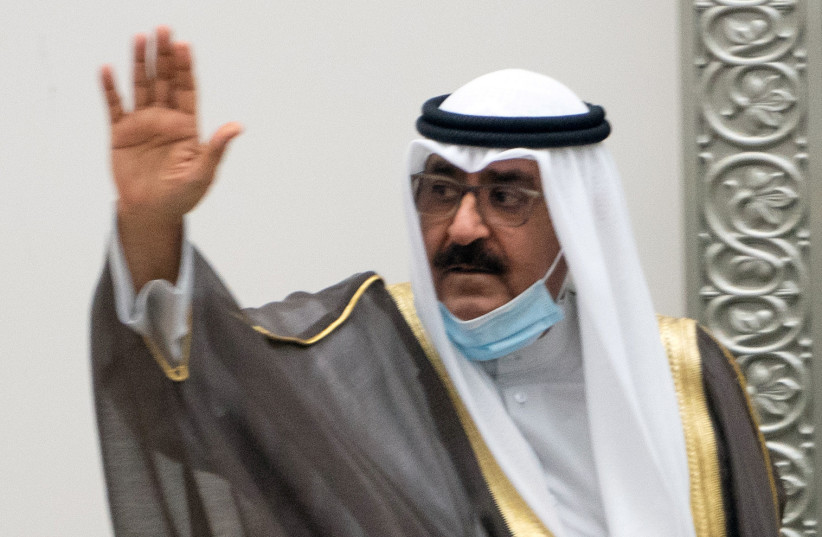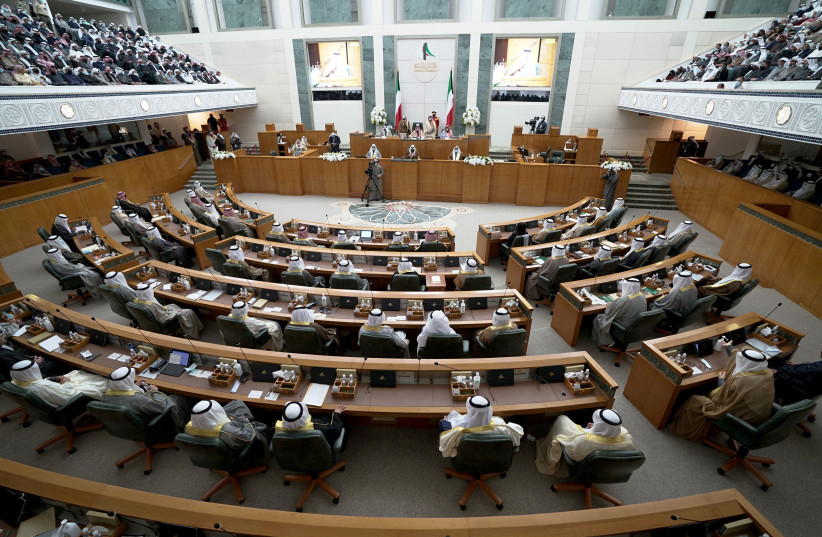The dissolution of the government is common in Kuwaiti politics, where the emir is entitled to dissolve the National Assembly as long as he provides a reason.

Kuwaiti Crown Prince Sheikh Meshal Al-Ahmad Al-Sabah dissolved the country’s parliament by an Emiri Decree issued on Tuesday, several hours after the county’s new cabinet was sworn in.
The decree said that the government was dissolved in order “to rectify the political scene, the lack of harmony and cooperation … and behavior that undermines national unity, it was necessary to resort to the people…to rectify the path,” according to the Kuwait News Agency (KUNA).
Mohammad Alwahaib, of the Philosophy Department at Kuwait University, told The Media Line that the dissolution of the parliament is not an unusual occurrence in his country.
“This is a common case for Kuwaiti politics. There is no parliament in the last 50 years that completed its constitutional period, which is four years,” he said.
He noted that the only difference this time is the fact that this is the first dissolution of the parliament under the current Emir of Kuwait, Nawaf Al-Ahmad Al-Jaber Al-Saba, and the authorities that he gave to the crown prince.
 A view shows the first parliament session held after elections, in Kuwait City, Kuwait, December 15, 2020. (credit: REUTERS/STEPHANIE MCGEHEE/FILE PHOTO)
A view shows the first parliament session held after elections, in Kuwait City, Kuwait, December 15, 2020. (credit: REUTERS/STEPHANIE MCGEHEE/FILE PHOTO)Democracy in Kuwait
Kuwait, which has 4 million inhabitants of which only 1 million are citizens, is a semi-democratic country with a hybrid political system that is made up of a popularly elected parliament, and a government appointed by the country’s emir. Kuwait is considered the most democratic Gulf country because it has the highest degree of constitutionalism.
However, the emir of Kuwait has a great deal of power when it comes to elections and government formation, George Emile Irani, an adjunct professor at the Universidad Alfonzo El Sabio in Madrid who until 2021 was an associate professor at the American University of Kuwait, told The Media Line.
Alwahaib explains that, according to Kuwait’s constitution, the emir is entitled to dissolve the country’s parliament, the National Assembly, as long as he provides a reason for the dissolution.
The constitution also imposes a limitation, Alwahaib added, which is that the emir cannot dissolve the parliament for the same reason twice.
After a National Assembly is dissolved, a new round of elections must be held in the country within two months, otherwise the dissolution is annulled and the National Assembly reinstated to its position.
This means that Kuwait must hold a new round of elections before October 2 of this year for the dissolution to be valid.
The last time the Kuwaiti parliament was dissolved occurred in 2016. Usually, the main reason for the dissolution of the government is when the country finds itself in a political deadlock between the parliament and the government, which puts a halt to reforms and investments in the country.
Alwahaib says that this time, one of the reasons for the deadlock involves a dispute between the opposition in parliament and the government, where the opposition openly backed Bader Al-Humaidi to become the speaker of the parliament while the government, which can also vote in the parliament, backed Marzouq Ali Mohammed Al-Ghanim.
Another factor, noted Alwahaib, is the inability of the former prime minister, Sabah Al Khalid Al Sabah, to pass a budget for 2022.
Later, when the parliament was about to vote for a non-cooperation motion that could end his career, “the prime minister decided not to enter the session of parliament that was appointed to vote. Probably because he knew that he couldn’t get the votes even from those who are pro-government,” Alwahaib said.
The head of the parliament decided not to hold sessions without the presence of the government. This is part of a constitutionally disputable but long-standing tradition that when the government is not present, the parliament is not in session. From this arose big questions regarding the actual democracy in Kuwait, he noted.
Alwahaib added that all of this happened in the aftermath of some large corruption scandals, in which many senior officials in the government and the army were accused.
Stability
“People of Kuwait appreciate that things are being more stable now, but basically for them, Kuwait is fine as long as they can get their subsidies every month and their salaries.”
George Emile Irani, Universidad Alfonzo El Sabio in Madrid
Irani noted that the dissolution of the parliament will not really affect the stability of the Arab Gulf country.
“It won’t have any impact on the stability of the country because Kuwait is a very rich country that has a lot of resources,” he said. “People of Kuwait appreciate that things are being more stable now, but basically for them, Kuwait is fine as long as they can get their subsidies every month and their salaries.”
“They’ll form a new government and then things will go on,” he said.